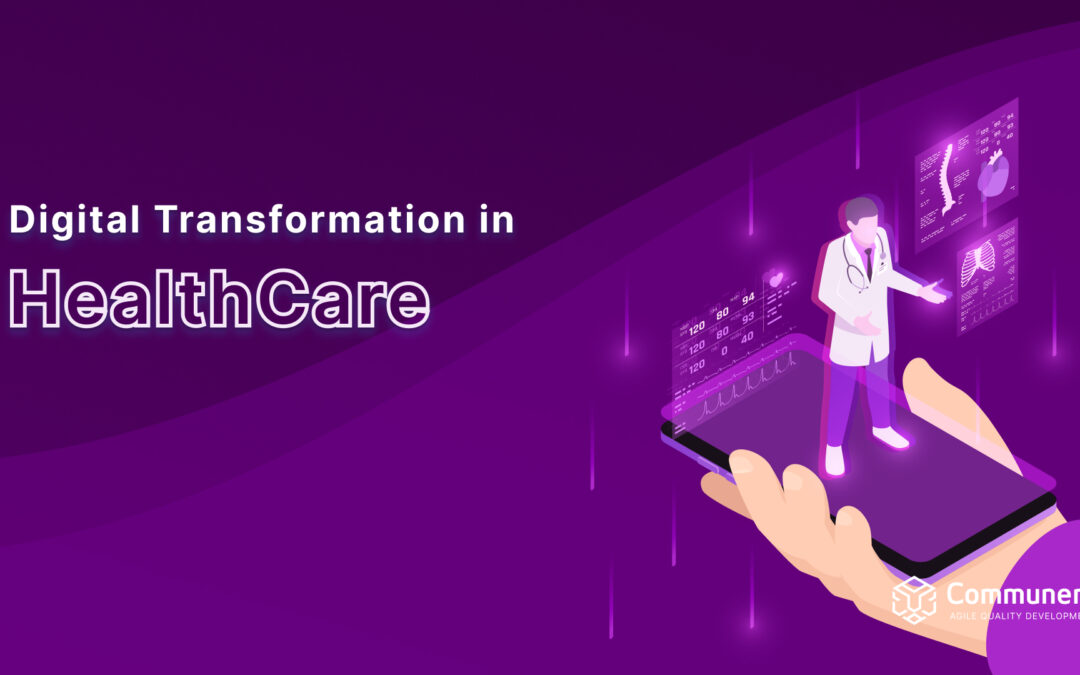The journey of healthcare technology has been a remarkable one, shaped by continuous innovation and advancements. In the early 20th century, the stethoscope and X-ray revolutionised diagnosis. The latter half of the century witnessed the advent of life-saving technologies like MRI and CT scans. These milestones drastically improved patient care and set the stage for the digital revolution in healthcare.
The advent of X-ray technology in the late 19th century by Wilhelm Conrad Roentgen opened a window into the human body, allowing for non-invasive diagnosis of fractures and internal conditions. Fast forward to the mid-20th century, the development of the first heart pacemaker by Wilson Greatbatch marked a giant leap in cardiology, offering hope and extended life to individuals with heart rhythm disorders.
Below are some of the most significant milestones in healthcare technology that also serve as excellent examples of the role and impact of digital transformation in healthcare:
- Electronic Health Records (EHR): The shift from paper-based records to Electronic Health Records (EHRs) in the late 20th century was transformative. It allowed for centralised, comprehensive, and easily accessible patient information.
- Telehealth and Telemedicine: The late 20th and early 21st centuries saw the rise of telehealth and telemedicine. These technologies leveraged telecommunications to provide remote healthcare services, breaking geographical barriers and increasing accessibility.
- Artificial Intelligence and Machine Learning: The integration of AI and ML in healthcare marked a paradigm shift. These technologies enable data analysis, diagnosis assistance, and predictive analytics, enhancing clinical decision-making.
- Internet of Things (IoT) in Healthcare: IoT devices, from wearable fitness trackers to smart medical equipment, revolutionised patient monitoring and enabled real-time data collection for better treatment plans.
- Wearable Health Devices: Wearable technology, including smartwatches and fitness trackers, empowers individuals to monitor their health in real-time, promoting preventive care and a proactive approach to well-being.
These milestones not only signify monumental achievements in medical science but also serve as a testament to the relentless pursuit of innovation and the unwavering commitment of healthcare professionals to advance patient care.
Each breakthrough has contributed to the foundation upon which the digital transformation of healthcare now stands, propelling the industry towards an era of unprecedented connectivity, efficiency, and personalised care.
Table of Contents
- Significance of Digital Transformation in the Healthcare Industry
- 10 Examples Of Digital Transformation In Healthcare
- Impact of Digital Transformation on Healthcare Delivery
- Digital Transformation in Healthcare Market
- Overcoming Challenges in Digital Transformation
- Future Trends and Innovations in Digital Healthcare
- The Role of Patients in Digital Transformation
- Ethical Considerations in Digital Healthcare
- Monitoring and Measuring Progress
- Ensuring Cybersecurity and Compliance
- Digital Transformation in Healthcare FAQs
- What is the primary goal of digital transformation in healthcare?
- How can healthcare organisations ensure the security of patient data in digital systems?
- What are the key challenges faced while implementing digital transformation in healthcare?
- How can healthcare professionals adapt to the changing landscape of digital healthcare?
- What are some emerging technologies poised to revolutionise healthcare in the near future?
- Digital Transformation in Healthcare: A Conclusion
Significance of Digital Transformation in the Healthcare Industry
The significance of digital transformation in the healthcare industry cannot be overstated. It represents a profound shift in how healthcare is delivered, managed, and experienced, leveraging cutting-edge technologies to enhance virtually every aspect of the healthcare ecosystem.
10 Examples Of Digital Transformation In Healthcare
Here are ten examples of digital transformation in healthcare:
Electronic Health Records (EHRs)
The adoption of EHRs has greatly changed patient record-keeping. Healthcare providers now have digital access to comprehensive patient histories, allowing for more informed decision-making.
Telehealth and Telemedicine
These technologies enable remote consultations and care delivery. Patients can connect with healthcare professionals through video calls, reducing the need for in-person visits, especially valuable in situations like the COVID-19 pandemic.
Artificial Intelligence (AI) in Diagnostics
AI-powered algorithms can analyse medical images (e.g., X-rays, MRIs) to assist in diagnosing conditions. For example, AI can help identify anomalies or potential issues in radiology scans.
IoT-enabled Monitoring Devices
Wearable devices and IoT sensors allow for continuous monitoring of vital signs, providing real-time data to healthcare providers. This is particularly beneficial for patients with chronic conditions who require close monitoring.
Telemedicine Platforms
Companies like Teladoc and Doctor on Demand provide platforms where patients can connect with healthcare providers for consultations, prescriptions, and even mental health support, all from the comfort of their homes.
Healthcare Mobile Apps
There’s been an explosion of health and wellness apps that allow users to track their physical activity, monitor their diet, manage medications, and even communicate with their healthcare providers.
Robotic Surgery and Assistants
Surgical robots and AI-driven surgical assistants are transforming the operating room, enabling more precise and less invasive procedures.
Genomic Medicine
Advances in genomics and genetic testing are allowing for personalised treatment plans based on an individual’s unique genetic makeup. This can lead to more effective and tailored therapies.
Blockchain for Secure Health Records
Blockchain technology is being explored to securely manage health records. It ensures data integrity, enables patient control over their records, and protects against unauthorised access.
VR/AR in Therapy and Training
Virtual Reality (VR) and Augmented Reality (AR) are being used in medical education and therapy. For instance, VR simulations can provide realistic training scenarios for medical professionals, while AR can assist in surgeries by overlaying digital information onto a surgeon’s field of view.
These examples illustrate how digital transformation is fundamentally changing the way healthcare is delivered, making it more accessible, efficient, and personalised for patients and providers alike.
Impact of Digital Transformation on Healthcare Delivery
The impact of digital transformation on healthcare delivery is profound and far-reaching. Overall, digital transformation in healthcare elevates the quality and efficiency of healthcare services.
Improved Patient Care and Outcomes
Digital transformation enhances the quality of care by providing healthcare professionals with more accurate and timely information. This leads to faster diagnoses, personalised treatment plans, and ultimately, improved patient outcomes.
Enhanced Efficiency in Clinical Processes
Automation of administrative tasks, streamlined workflows, and reduced paperwork through EHRs contribute to more efficient clinical operations. This allows healthcare providers to allocate more time to direct patient care.
Accessibility and Reach to Underserved Communities
Telehealth initiatives and remote monitoring through digital technologies bridge the gap in healthcare access, particularly for those in rural or underserved areas. This democratisation of healthcare is a key facet of the digital transformation movement.
Data-Driven Decision Making
The wealth of data generated through digital technologies enables evidence-based decision-making. Analytics and predictive tools offer insights that lead to more effective treatment plans and strategies for population health management.
Digital Transformation in Healthcare Market
The digital transformation in healthcare has spurred a dynamic market characterised by rapid innovation and substantial investment.
Market Trends and Growth Drivers:
The global digital healthcare market is experiencing robust growth, driven by factors such as:
- Increasing adoption of EHR systems by healthcare providers.
- Growing demand for telehealth services, especially post-COVID-19 pandemic.
- Advancements in AI and ML technologies, propelling clinical decision support systems.
Key Players in the Healthcare Technology Industry:
Prominent players in the healthcare technology space include established companies like Cerner Corporation, Epic Systems Corporation, and Siemens Healthineers, as well as innovative startups like Teladoc Health and Babylon Health.
Investment and Funding Landscape:
The healthcare technology sector continues to attract significant investment. In 2021, global digital health funding reached a record high of $28 billion, reflecting investor confidence in the sector’s growth potential.
Overcoming Challenges in Digital Transformation
While the benefits of digital transformation in healthcare are immense, it’s not without its challenges. Successfully surmounting these challenges is crucial to seamlessly implementing digital transformation initiatives.
Data Security and Privacy Concerns
Security and privacy are one of the significant challenges of digital transformation. As healthcare embraces digital technologies, safeguarding patient data becomes paramount. Robust encryption, access controls, and compliance with data protection regulations are essential measures.
Integration of Legacy Systems
Many healthcare facilities still rely on legacy systems that may not seamlessly integrate with modern digital platforms. Transition strategies and interoperability solutions are crucial in bridging this gap.
Staff Training and Adoption
Ensuring that healthcare professionals are proficient in using digital tools is critical for successful digital transformation. Comprehensive training programs and ongoing support are essential components.
Regulatory Compliance and Standards
Adherence to regulatory frameworks, such as HIPAA in the United States, is non-negotiable. Healthcare organisations must navigate complex compliance requirements to avoid legal and financial repercussions.
Consulting with a digital transformation company can help you mitigate all the above challenges to a great extent.
Future Trends and Innovations in Digital Healthcare
The future of digital healthcare promises even more transformative technologies. These trends represent the cutting edge of healthcare innovation, paving the way for more effective and personalised care.
Predictive Analytics and Personalized Medicine:
Advancements in predictive analytics will enable healthcare providers to anticipate patient needs and tailor treatment plans accordingly. Personalised medicine, guided by genetic and molecular insights, promises more effective therapies.
Blockchain Technology in Health Data Management:
Blockchain offers a secure and transparent method for managing health records. It ensures data integrity, interoperability, and patient consent, addressing many of the current challenges in health data management.
Virtual Reality (VR) and Augmented Reality (AR) in Medical Education and Therapy:
These immersive technologies have the potential to revolutionise medical education and therapy. From surgical simulations to pain management techniques, VR and AR offer innovative solutions for healthcare professionals and patients.
The Role of Patients in Digital Transformation
Digital tools empower patients to take an active role in their own health management. Access to personal health data, educational resources, and communication channels with healthcare providers fosters a sense of ownership.
Apps and platforms that facilitate patient engagement provide reminders for medication adherence and offer lifestyle management guidance play a pivotal role in disease prevention and management.
Ethical Considerations in Digital Healthcare
Digital healthcare solutions must be accessible to all, regardless of socioeconomic status or technological literacy. Addressing disparities in access and usability is essential for equitable healthcare delivery.
Respecting patient autonomy in decision-making and obtaining informed consent for the use of digital tools is fundamental. Transparency about data usage and privacy policies is crucial for building trust.
Monitoring and Measuring Progress
Establishing key performance indicators (KPIs) allows healthcare organisations to track the impact of digital transformation efforts. Metrics like patient satisfaction, readmission rates, and clinical outcomes provide valuable insights.
Regularly monitoring KPIs enables healthcare providers to identify areas for improvement and make necessary adjustments to their digital transformation strategies. It ensures that efforts are aligned with desired outcomes.
Challenges are inevitable in any transformation process. Proactive identification of obstacles, coupled with agile responses, ensures that the digital transformation journey remains on course.
Ensuring Cybersecurity and Compliance
As the healthcare industry embraces digital transformation, ensuring the security and compliance of patient data is of paramount importance.
Building a robust security infrastructure, including firewalls and encryption, is essential. Implementing real-time threat monitoring systems and having incident response plans in place allows healthcare organisations to respond to security breaches and mitigate potential damage swiftly.
Staying abreast of evolving data protection laws and ensuring compliance is essential. This includes GDPR in Europe, HIPAA in the United States, and other region-specific regulations. Additionally, proactive threat monitoring and incident response plans are crucial in safeguarding against cyber threats.
By prioritising cybersecurity and compliance, healthcare organisations can maintain trust and protect the integrity of patient information in the digital age.
Digital Transformation in Healthcare FAQs
What is the primary goal of digital transformation in healthcare?
The primary goal of digital transformation in healthcare is to leverage technology to improve patient care, enhance operational efficiency, and drive better clinical outcomes. It aims to revolutionise how healthcare is delivered and experienced, ultimately leading to a higher quality of care for individuals and communities.
How can healthcare organisations ensure the security of patient data in digital systems?
Healthcare organisations can ensure the security of patient data by implementing robust security measures. This includes data encryption, access controls, regular security audits, and compliance with data protection regulations like HIPAA or GDPR. Additionally, staff training on security best practices and proactive threat monitoring are essential components.
What are the key challenges faced while implementing digital transformation in healthcare?
The key challenges in implementing digital transformation in healthcare include:
- Data Security and Privacy Concerns: Protecting patient data from cyber threats and ensuring compliance with data protection regulations.
- Integration of Legacy Systems: Bridging the gap between existing, often outdated, systems and modern digital platforms.
- Staff Training and Adoption: Ensuring healthcare professionals are proficient in using digital tools.
- Regulatory Compliance and Standards: Navigating complex compliance requirements, such as HIPAA, in the United States.
How can healthcare professionals adapt to the changing landscape of digital healthcare?
Healthcare professionals can adapt by embracing continuous learning and training in digital tools and technologies. They should actively engage with digital platforms, stay updated on industry trends, and collaborate with IT experts within their organisations. Openness to innovation and a patient-centric approach are crucial in navigating the evolving landscape.
What are some emerging technologies poised to revolutionise healthcare in the near future?
Emerging technologies set to revolutionise healthcare include:
- Predictive Analytics and Personalized Medicine: Anticipating patient needs and tailoring treatment plans for better outcomes.
- Blockchain Technology in Health Data Management: Ensuring secure and transparent management of health records.
- Virtual Reality (VR) and Augmented Reality (AR) in Medical Education and Therapy: Transforming medical education and therapeutic interventions.
Digital Transformation in Healthcare: A Conclusion
The digital transformation in healthcare is not just a technological evolution; it is a paradigm shift in how healthcare is delivered, experienced, and managed. From Electronic Health Records to AI-powered diagnostics, every facet of healthcare is being redefined. This transformation promises improved patient outcomes, enhanced efficiency, and greater accessibility. As we look ahead, the continuous evolution of healthcare technology will undoubtedly bring even more groundbreaking innovations, ultimately leading to a healthier, more connected world.




![Why Custom Web Development is the Best Approach [2024]](https://resources.communere.com/wp-content/uploads/2024/02/Why-Custom-Web-Development-is-the-Best-Approach-1024x570.jpg)

